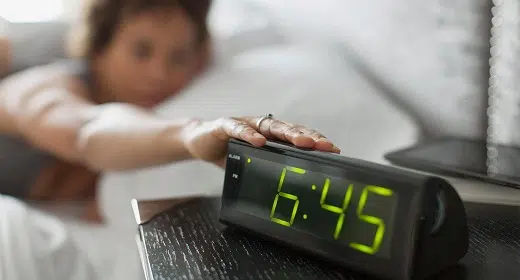by Alexa Mikhail: Many people dread the blaring sound of an alarm clock, signaling the start of a busy workday. Others wish that they weren’t already awake and that the sound had actually woken them up…
Waking up minutes or even hours before the alarm is not a new phenomenon, sleep experts tell CNN, but it can cause people incredible discomfort. The additional stress factors from the ongoing pandemic have exacerbated our collective sleeping struggles.
More than a third of Americans get fewer hours of sleep a night than the minimum recommendation of seven hours, according to the US Centers for Disease Control and Prevention. According to the National Institute of Health, studies across the globe show anywhere from 10% to 30% of the population struggles with insomnia, defined as the consistent difficulty falling asleep and the inability to return to sleep after going to bed.
Those experiencing insomnia can have a combination of “nocturnal awakenings” and what’s categorized as “early morning awakenings,” according to a 2009 study from the Stanford Sleep Epidemiology Research Center and other universities. The study finds that some people may experience early awakenings without other insomnia symptoms such as “difficulty initiating sleep,” “nocturnal awakenings” and “non-restorative sleep,” meaning sleep that isn’t substantial even with the recommended hours.
“That’s a little bit of a myth that insomnia is only falling asleep,” said sleep specialist Rebecca Robbins, an instructor in the Division of Sleep Medicine at Harvard Medical School. “A common complaint is excessive sleepiness and waking up and feeling very unrefreshed.”
While insomnia treatments include cognitive behavioral therapy and medication, other daily tips can have an impact on early morning awakenings. An acute sleep disorder could be at play for someone not experiencing chronic insomnia but waking up early.
“Sleep is an artifact of our waking lives,” Robbins said. “If you’re experiencing hardship, trauma or something unsettling happening … those events loom large for our sleep.”
The constant waking up before that daily sound is coupled with an immense frustration about not falling back asleep. The stress can feel isolating and all-consuming, taking more precedence than the initial sleep problem.
“You start ruminating about it, and then you start doing things that make insomnia worse,” said Dr. Rajkumar Dasgupta, associate professor of clinical medicine at the University of Southern California Keck School of Medicine in Los Angeles. “Don’t start telling yourself … ‘I’m going to make myself stay in bed until I fall asleep.’ “
So, what can you do about it?
Don’t watch the clock or your phone
If you wake up suddenly — in what feels like the early morning hours — resist checking the clock. Finding out it’s 3 a.m. when you set the alarm for 7 a.m. can cause increased stress about the hours of sleep you hoped to attain.
“The anxiety and the frustration build. … Clock watching becomes habitual, and that habitual response of frustration and anxiety also causes a stress response in the body,” said sleep specialist Wendy Troxel, a senior behavioral scientist at Rand Corp.
Get out of bed
So paradoxically, experts say to get out of bed. Yes, even at 3 a.m.
“Abandon the idea of getting back to sleep,” Troxel said. “When you do that, when you let the pressure go that sleep isn’t so effortful, sleep is more likely to come back.”
In a stimulus control technique, you can distract your brain with a mundane task to help bring back drowsiness faster than staying frustrated in bed.
“As soon as that little voice comes on, change the environment. Get out of bed,” Robbins said. “Try to reset your brain and keep the lights low.”
Mentally assigning the bed with sleeping helps people associate positive sleep thoughts with their space. Leaving the room when agitation sets in can separate the frustration from the bed.
Anything from reading a book to knitting or listening to soft music (but not using a phone) can positively distract the brain. Once drowsiness sets in again, head back to bed.
Log what works and what doesn’t
Dasgupta recommends keeping track not only of when you went to bed and woke up on a given night, but also the calming techniques, environmental factors — and even nutrition and exercise routines that seemed to help you sleep that day.
“Perfect sleep is like having a puzzle, and you need all the right pieces,” Dasgupta said. “People who have insomnia, they’re missing one of those sleep hygiene pieces. When you make your recommendation, like a muscle relaxation, maybe that’s not the thing that they were missing. Maybe sound wasn’t the key part. Maybe you need more of that weighted blanket.”
It also depends on our given circadian rhythm, or the 24-hour solar cycle the body runs on that alerts us when sleepiness sets at night. If any environmental factors change — such as travel, work schedule or lighting — the body’s circadian rhythm may be off, signaling an uncomfortable early wake-up before the alarm, Dasgupta said. In this case, changing the lighting in a given room or getting alternative lighting could help.
Progressive muscle relaxation may work — start at the toes, clench the given muscles for three seconds and release. Breathe through this process. The 4-7-8 breathing exercise coupled with muscle relaxation can be successful, Dasgupta said. You breathe in for 4 seconds, hold it for 7 seconds and breathe out for 8 seconds.
Others may find that yoga, meditation or reading can help when they wake up before their alarm.
The key here as well is to get out of bed.
The same techniques don’t work for everyone, but practicing various strategies that may affect sleep is critical, ultimately building a well-followed routine.
“Take it in stride,” Robbins said. “That’s the reason we consciously use this word ritual before bed because it’s ideally strategies that you build into your routine. It’s your toolkit.”
If the problem continues beyond three times a week for three months, Robbins recommends talking to a sleep specialist. It may require more than a simple habit change.









































